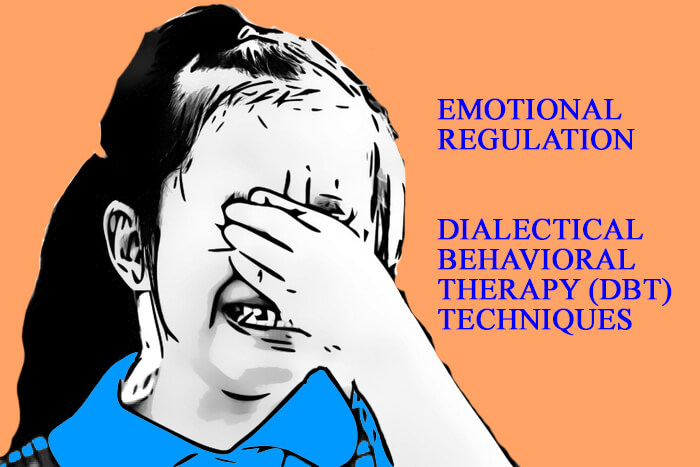Emotional Regulation – Dialectical Behavioral Therapy Techniques

Emotional Regulation is not just stopping action tendencies before you act in a foolish/unproductive/unbeneficial way. It is an integral part of the entire emotional mechanism to include other components of the regulation process. It includes dealing with the object that triggers the emotion (avoiding a car in our path). It includes managing biased appraisal with re-appraisal, re-evaluation or reframing or changing our way of thinking. It includes managing and calming our physiological reaction (deep breathing, relaxation techniques). And it also includes managing our action tendencies (avoid yelling or hitting).
We naturally try to regulate our emotions for ourselves as well as others – keeping them in balance and away from extremes. We try to feel better after disappointment or try to contain our love until our partner reciprocates. We try to deescalate a provocative situation. We try to regulate by tempering difficult negative feelings, such as toning down fear in an emergency situation or by amplifying them, in a situation that we want to throw a tantrum to get our way. We can change our feelings by looking at the worst-case scenario or by looking at the full half glass.
We regulate our emotional state to remain calm, to our advance our goals or best interest in the long run and other examples such as pushing ourselves to wake up in the morning to work when we don’t want, or to cheer our kids when they are sad, to maintain certain behavioral standard or adhere to a social norm.
Dialectical Behavior Therapy (DBT), a specific type of cognitive-behavioral psychotherapy developed by psychotherapist Marsha M. Linehan, helps individuals develop skills for emotional regulation. It explains the function and purpose of emotions, the impulsive action that accompanies the emotions, and more importantly to re-evaluate the urges to act considering our best self-interest.
The following three emotional management skills were designed to reduce vulnerability, increase resiliency and improve overall mental health: We regulate our emotional state to remain calm, to our advance our goals or best interest in the long run and other examples such as pushing ourselves to wake up in the morning to work when we don’t want, or to cheer our kids when they are sad, to maintain certain behavioral standard or adhere to a social norm.
Label your Emotions
A powerful tool in emotion regulation is simply identifying and naming the emotion you are feeling. The idea behind this skill is to manage emotion by first recognizing the emotion, and name it, which allow access to the “cognitive brain” and move out of the “emotional brain.”
Mindfulness
Based on Tartakovsky, mindfulness is described as simply living your life in the present moment instead of being stuck in the past or the future. This concept helps us become more aware of our emotions and thinking patterns and make us understand how our feeling and thoughts and feelings affect each other and impact our reactions. Some aspects of mindfulness include objective observation, non-judgmental perspective, and open and curious attitude.
Ride the Wave
Riding the wave is a concept and skill that is part of a larger psychotherapy model of DBT that metaphorically compare emotions to the waves in the sea. Just as the waves in the sea change, so do our emotions. Similar to waves, our emotions can be calm and peaceful one moment and at another rocky and unpredictable. Individuals may be flooded with negative emotions, such as feelings of hopelessness and stress. If you are like a surfer can ride the waves of emotions, you can use the power of emotions and channel them constructively rather than resisting it. Surfing the wave involves observing and experiencing the feelings without resistance or trying to change it. You allow yourself to feel the feelings, which allows the emotions to fulfill their task and naturally dissipate while reaching their natural conclusion. Riding the wave may seem counterintuitive, as accepting painful emotions, but in the long run, it allows for freedom from suffering.
The above DBT – emotional regulation skills are simple but not easy. As you practice those skills, you will gain greater ability and confidence in dealing with your difficult emotions. So be patient, and you will find the reward of managing your emotions to better your life





